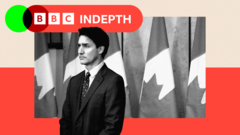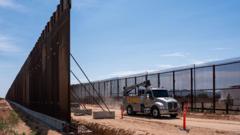The immigration debate in Canada, once largely avoided, has intensified significantly, contributing to widespread discontent and impacting political dynamics, particularly with Justin Trudeau's resignation amid low approval ratings and calls for tighter immigration controls.
Rising Immigration Concerns Shift Canada’s Political Landscape

Rising Immigration Concerns Shift Canada’s Political Landscape
An examination of the evolving immigration debate in Canada and its implications for the political future after Trudeau’s recent resignation.
The immigration discourse in Canada, long considered a hallmark of its inclusive identity, has taken a contentious turn, impacting the political scene following Prime Minister Justin Trudeau's resignation amid rising public unrest. With housing shortages and skyrocketing rents weighing heavily on citizens, Canada's usually welcoming stance towards newcomers is being re-evaluated, marking a profound shift in public sentiment.
In an example reflective of this crisis, listings for bizarrely cramped rental spaces, such as a converted bathroom in Brampton for C$550, have surged online, illustrating the desperate housing situation. Reports indicate more than 2.4 million families in Canada are experiencing substandard living conditions, sparking urgent discussions about immigration and its strain on housing resources.
For the first time, a majority of Canadians, once celebrated for their openness to immigration, now express concerns about its levels. Recent surveys show that from 27% in 2022 believing immigration was excessive, this figure jumped to 58% by 2024. Protests have emerged in various Canadian cities, indicating a shift towards acceptance of the issues surrounding immigration that were once considered taboo.
Trudeau's decision to resign on January 6 reflects the growing dissatisfaction with his administration's handling of immigration and housing policies. His approval rating plummeted to a mere 22%, a stark contrast to the 65% approval he garnered when first elected. Although immigration may not be the sole factor behind his resignation, it has been seen as a significant contributor amid broader challenges including inflation.
The surge in Canada’s population, largely driven by immigration, now presents new complexities as rising dissatisfaction surfaces. Conservative Party leader Pierre Poilievre has capitalized on this growing unease, advocating for reduced immigration in the next electoral campaign while cautiously balancing the sentiment of a populace in various immigrant-heavy ridings.
The recent shift in perception may also be influenced by Donald Trump’s return to prominence in the U.S. political landscape, stoking fears around immigration policies and prompting calls for increased border security. Past experiences of soaring asylum claims during Trump’s initial term remind many Canadians of the instability that can accompany such shifts.
While some argue that immigration is unfairly blamed for the housing crisis, with concerns attributed to longstanding political failures to address affordable housing, the rising anti-immigrant sentiment is undeniable. Instances of new immigrants facing hostility, amplified by social media narratives, have further complicated their situation and sense of belonging in Canada.
Facing the challenges ahead, Trudeau announced an adjustment in immigration targets, reducing numbers by 20% over three years in hopes of allowing local governance to adapt. However, the looming impact of the Conservative Party's policy adjustments and the heightened focus on immigration and housing affordability leaves unanswered questions about Canada’s future approach to its immigration system amid significant public pressure.
The ongoing discussions reflect not only a concern for immediate economic realities but also highlight a nation grappling with its identity as it seeks to balance compassion and practical governance in uncertain times.


















